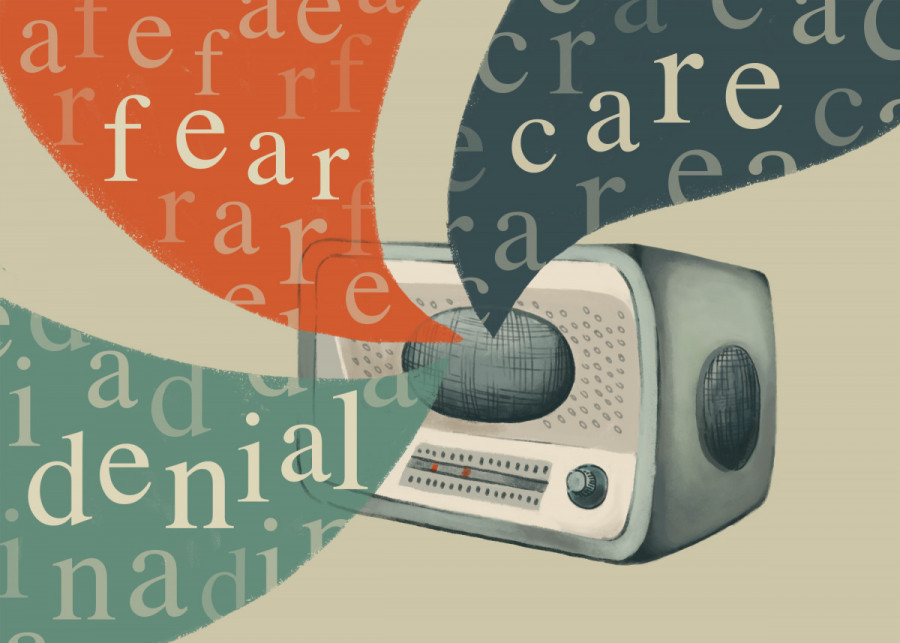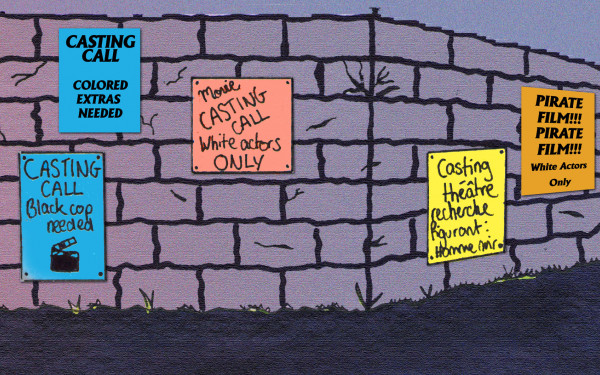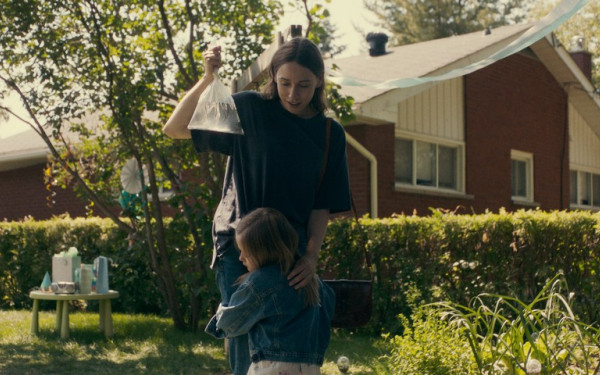Tune in to denial, fear, and care at Imago’s ‘Tuning In’
A moving collection of radio plays written by women across Canada
Tuning In is a collection of one-act radio plays exploring themes of denial, fear and care that will be broadcast live April 2, 3, and 4 at 7:30 p.m. The event is produced by Imago Theatre in partnership with the MAI cultural centre.
Three brilliant playwrights from across Canada with various ties to the Montreal theatre scene come together to share a multitude of perspectives. Each night, all three plays—Yvette Nolan’s Lâche Pas La Patate, Audrey Dwyer’s The Ringtone and Amy Lee Lavoie’s Scout’s Honour—will be performed live in studio by the actors and foley artist.
The playwrights were chosen by Imago’s artistic director Micheline Chevrier, who knew of their work and wanted to seize this opportunity to collaborate long distance.
Nolan is an accomplished Algonquin playwright, director and dramaturg living in Saskatoon. Her play Lâche Pas La Patate is an exploration of memory, denial and forgiveness. When a brother and sister must decide what to do with their father's ashes, their contradictory childhood memories complicate things. Since both their parents are dead, and the brother’s been absent, the sister doesn't want to corrupt his memories.
As a child, Nolan’s mother would use the phrase “lâche pas la patate," which means different things in different contexts. This metaphor usually means “hang in there” although it literally translates to “don’t drop the potato."
Lâche Pas La Patate is one of Nolan’s most personal plays. During this time, she’s found, like Dwyer and Lavoie, that examining personal events comes more naturally than before. Her play asks the audience which, if any, memories they can trust. As she rebuilds the relationship with her brother in real life, she’s “finding out they remember things completely differently.” Nolan’s previous works explore bigger but still personal topics.
“I'm talking about Indigeneity, art and the Canadian national idea," she said. The radio format is more intimate since the action is happening inside the listener's head—it compliments more personal situations.
Dwyer is an esteemed comedic and dramatic writer currently living in Winnipeg. She was trained in acting at the National Theatre School and works as the artistic director of the Royal Manitoba Theatre Centre. Her play, The Ringtone, is a dramatic piece that explores racism, sexism and fear. A woman wakes up on someone else’s porch and can’t remember how she got there. This leads to an exploration of the mind, the structures around her and ultimately, high-end grocery shopping. The play asks the audience to engage with microaggressions that some may recognize, and some may not.
“Because they are microaggressions, it can sometimes be hard to navigate those events, it can even be hard to know when those things are happening,” Dwyer said on the complexity of this topic.
She wanted to consider the possible outcomes of a situation that evokes fear or terror and how people with different experiences have varied connections to those situations. She examined this by creating big dramatic action.
“When the characters have a huge problem to solve, it puts the audience in an empathetic place.”
Lavoie is an award-winning playwright trained at the National Theatre School currently living in Vancouver. She has been recognized for her lyrical and collaborative work. Scout’s Honour is based on her real-life experience with her rescue dog Lionel Itchy.
In the play, a husband and wife are faced with an impossible decision: to put their beloved dog down or to use the last of their savings to save him. This is complicated by the fact there is uncertainty about the illness. “Thousands of tests, lots of money, [and] heartache” set the scene for this play.
“I’m talking about Indigeneity, art and the Canadian national idea.” — Yvette Nolan
The play looks at how the trendy nature of dog rescuing overlooks certain realities. In Lavoie’s search for community, she noticed this aspect of dog ownership was unspoken. Lavoie spent a lot of time considering speciesism and the interaction between animal care systems and owners.
“Can only rich people have dogs with medical problems?” Lavoie said on the questions her play examines.
Lionel’s pre-existing condition—epilepsy—meant he did not qualify for insurance. Lavoie's inspiration comes when she is moved, “usually to anger.” In this case, frustration was the engine. Recordings of Lionel taken for vet inspired the foley artists’ portrayal of the dog. The themes explored in this play, like the others, evoke strong emotions.
The live radio format comes with challenges that forced the team to consider the “economy of language” as articulated by Lavoie. For Dwyer, this meant eliminating unnecessary repetition and making sure the story builds. Her writing style is intentional and aims to “carry the listener in a very visceral and very clear way.” Nolan’s experience with the radio format is no different. Since she’s never done much in the way of stage directions, she already had a grip on keeping the story contained in the dialogue. Her focus was on guiding the listener down the right path in terms of the images they construct in their mind. Although, she doesn’t intend to control them.
“I’ve been giving up control,” Nolan said about evolving as a playwright.
The choice of radio play was deliberate. Chevrier wanted to explore live performance art in a format that is meant to be enjoyed outside of a theatre. Zoom plays can be hard to watch and lack the energy of in-person performances. For this reason, Chevrier was more interested in shorter stories, in forms they are intended for. The radio play is a Canadian tradition—radio dramas on CBC and Radio Canada were once very popular.
The directing process for a radio play involves directing sound with foley artist Evan Stepanian and actors' intentions. Chevrier, who is also the co-director of Lavoie’s Scout’s Honour, described the process, she closes her eyes and then asks questions like “does that sound like different rooms or does that sound like they're in the same room?” This is necessary when creating a universe with sound alone.
Tuning In’s topics of denial, fear and care all stem from feelings during the pandemic. These topics were then interpreted by the playwright and the themes became more specific to their experience. For example, Imago’s creative team wondered why many people were denying the realities of COVID-19. Nolan then chose to look at selective memory and the construction of reality as it relates to family.
To attend, audience members do not need to register. They must simply click the link on the Imago theatre’s website. The commissioned event is free with an option to Donate-What-You-Decide with all proceeds going to The Open Door, a drop-in center for homeless and low-income people in Downtown Montreal.







